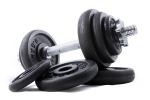- FreeTrainers.com Forums
- General Fitness & Exercise
- Confused About Heart Rate
Group: General Fitness & Exercise
Created: 2011/12/31,
Members: 383,
Messages: 54581
Various general exercise related discussions. Find out what it takes to reach your fitness goals through daily effective exercise. With so many options we try to find out what works best.
Join group
Confused About Heart Rate

tinman1412
Posts:
19
Joined: 2004/08/17  |
2004/10/12, 05:30 PM
I went to a personal trainer at my gym today and got an assessment. One of the things he told me was that the best way to lose body fat was to do cardio and maintain your heart rate. He said that I need to keep my heart rate at 150. This sounds way too high compared to what the cardio machines says at my gym. The machine is around 125. Below are the my information that he based this on. Can someone please let me know if the personal trainer's assessment is correct.
My Resting Heart Rate - 72 beats/min Weight - 155 lbs Height - 5'8" Body Fat - 12% Thanks, |
|
| |

asimmer
Posts:
8,201
Joined: 2003/01/07  |
2004/10/12, 09:10 PM
Understanding Your Target Heart Rate Zone
Understanding your Target Heart Rate Zone (THR) and working within its boundaries will help you maximize your time spent doing cardiovascular exercise. When you exercise at the correct intensity you will achieve a higher level of fitness more easily than if you are constantly over-exercising (and fatiguing your heart) or under-exercising (and not challenging your body). There are different ways to track your heart rate while exercising, some more convenient than others. The simplest and most ‘hands-free’ method is to purchase a heart rate monitor that you wear around your chest. The monitor then picks up your heart rate and transmits it to either a wristwatch display or the cardio equipment you are on (if it is compatible). Monitors range from very simple up to very complex. A simple monitor will do if you can remember your THR, a more complex monitor can be programmed to alert you when you reach certain heart rate ranges. The next method is a little more involved. You can take your pulse for 15 seconds and multiply the number of beats by four, thus getting your Beats Per Minute (BPM). To do this you need to find your pulse on your wrist just below the thumb side of your palm, using your first two fingers count the pulses while watching the seconds hand on your watch. You need to keep moving while you do this (so your blood pressure/heart rate doesn’t drop off and make you dizzy). Example: I counted 21 beats in fifteen seconds, therefore 21 X 4 = 84 BPM. Another way to monitor your intensity while exercising is your Perceived Rate of Exertion. This method may not be as accurate, but will do if you don’t want to monkey around with a HR monitor. Perceived Rate of Exertion basically has you ask yourself “How do I feel?”. If you can easily talk and are breathing normally, you are at a very low level of exertion. When you are bringing your intensity up, to challenge your system and improve your fitness level, you should be able to talk in-between breaths. So, if someone walked up to you while you were doing your cardio and asked “How do you like the weather we’re having?” You could answer “I” breath “like it” breath “just fine” breath. Now your are at the higher end of your intensity. If you get to the point where you cannot answer a question and are gasping to get in enough air you are working too hard and will not increase your fitness level. High intensity bursts are okay, for short intervals like a minute or two, but you will wear your heart out if you try to push it too hard for too long! Last, but not least, you can monitor your heart rate using the hand-held sensor pads available on some cardio equipment. The drawback is that sometimes these pads don’t function very well and sometimes you will get erratic readings from them (some CD players and radios seem to effect them). Okay, now you now the different methods for determining your heart rate and if you are in the ‘zone’. But what is your zone? On the next page we will calculate your Target Heart Rate Zone. Target Heart Rate Zone Client ___________________________________________________ 220-_________= _________. This is your Maximum Heart Rate. (age) Max Heart Rate______ X 55% = __________ Low end of THR Zone Max Heart Rate ______ X 75% = __________ Middle range of THR Zone Max Heart Rate ______ X 85% = __________ Upper end of THR Zone Max Heart Rate ______ X 90% =___________ Top of THR Zone - Intervals only. When you do your cardiovascular/ aerobic activities you need to get your heart rate at least above ____________ but not above ________ . (low end THR) (upper end THR) For High Intensity Interval Training you might get your heart rate up to the top end of your THR Zone, but you should only keep it there for one or two minutes and your recovery time at a lower intensity should be as long or longer than the time you had it up. If you want to know how to tell if you have increased the level of your cardiovascular fitness you can try this simple method: One day each week, before you get up out of bed in the morning, take your pulse for one full minute and write it down. This number is your Resting Heart Rate. If the number tends to stay the same, you are maintaining your current level of fitness. If the number decreases each week or two, you are increasing your fitness level (keep up the good work!). If the number gets higher, you are working out too intensely and fatiguing your heart, slow down a little and watch your Target Heart Rate while exercising! If you have any further questions about cardiovascular exercise please ask your trainer, that is part of their job! Please note: These methods do not replace the advice of your physician and do not take into account any heart problems or medications that may affect your heart rate. Anyone starting on an exercise program should discuss it with their physician. V.I.P. training, Inc. is not liable for any health issues resulting from these instructions. This is for informational purposes only. |

tinman1412
Posts:
19
Joined: 2004/08/17  |
2004/10/12, 10:42 PM
Assimer, thank you very much for clearing that up. What I find interesting is that from everything I've read along with everything in this forum, one of the best ways to achieve fat loss is to do cardio first thing in the morning at moderate intensity for 30-45 minutes, usally around 65%. Based on the above calculations, my Target Heart Rate comes out to about 126, which is exactly what the machines at my gym indicates when I enter my age and weight. My trainer is suggesting a Target Heart Rate of 155, which is around 80% intensity for 3-45 minutes. Is this safe? I have not found anything that says you should do cardio at this much intensity for that long period of time, with the exception of HITT. Has anyone done this type of cardio at that much intensity?. Please advise
|

asimmer
Posts:
8,201
Joined: 2003/01/07  |
2004/10/13, 08:17 AM
It is okay to workout in your 80% zone, but you need to gradually build your endurance up.
My learning is that anything over 45 minutes is no longer beneficial to your fitness level. And staying up in the high end of your zone that long could contribute to muscle loss. The thing about doing higher intensity is that you can burn the same amount of calories, but in less time. So, say you burned 300 calories going at a low intensity, in 40 minutes, you might burn 300 calories in 20 minutes at a higher intensity. The total caloric burn overshadows the theory that you will burn more fat in a lower zone. At a lower heart rate a higher percentage of calories may come from fat burning, but at a higher intensity you will burn more calories and a percentage of them will be from tapped bodyfat stores, so it kind of even outs. I recommend to my clients that they alternate types and intensity levels day to day, and that is how I do cardio, also. Day one I might do 30 minutes higher intensity, next time I might do HIIT, another day a 45 minute lower intensity program. Use different machines and intensities - it will also keep you from getting as bored. Again - before you do 45 minutes of anything, you need to build up to it gradually so you don't fatigue your heart. I hope I didn't just make this more confusing:surprised: -------------- "Achieving worthwhile goals requires a consistent investment of time and effort on your part....The rewards you receive will be in direct proportion to the consistent effort you put forth." Brian Johnston, The Power of The Champions |
